Products That Are Often Stored in the Fridge but Shouldn’t Be
The refrigerator is a wonderful invention that removed many issues and difficulties from people’s lives. However, sometimes we put too much faith in this appliance. The fact is some products can be stored both in cold and warm conditions, while for others, the temperature inside the fridge is actually harmful.
5-Minute Crafts figured out what types of products shouldn’t be stored at low temperatures. The bonus feature at the end will show you a full list of such products.
Bananas
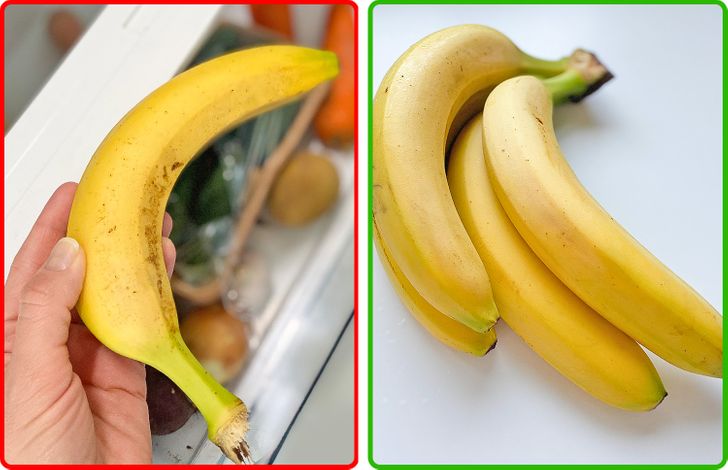
- Banans quickly turn black in the fridge. What’s more, their structure will change too.
- These so-called fruits (they’re actually berries from the perspective of botany) should be stored at room temperature.
- If bananas are green, it’s better to store them in a bowl or to hang them so that they don’t get covered with brown traces and dents.
- Normally, bananas are transported at 34°F at a certain humidity and ventilation. Such conditions are required to prevent green bananas from ripening too quickly.
- In order to make bananas ripen fast in home conditions, put them next to apples, potatoes, or avocados.
- In order to make them ripen slower, wrap the stem with cling film or foil. It will slow down the ripening process.
Basil
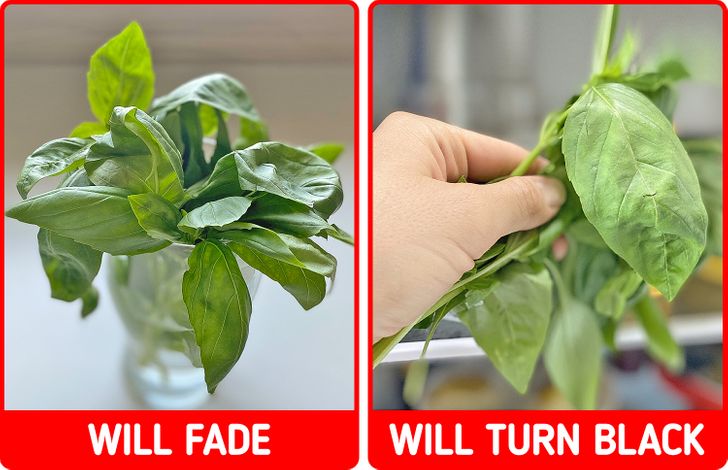
- Basil leaves will likely turn black in the fridge quite quickly.
- Basil is a very naughty type of greenery.
- In order to keep it fresh, put a bunch of basil into a jar or glass with water, cover it with a plastic bag, and periodically change the water.
- If you don’t use a bag, basil will fade within several hours.
Greens
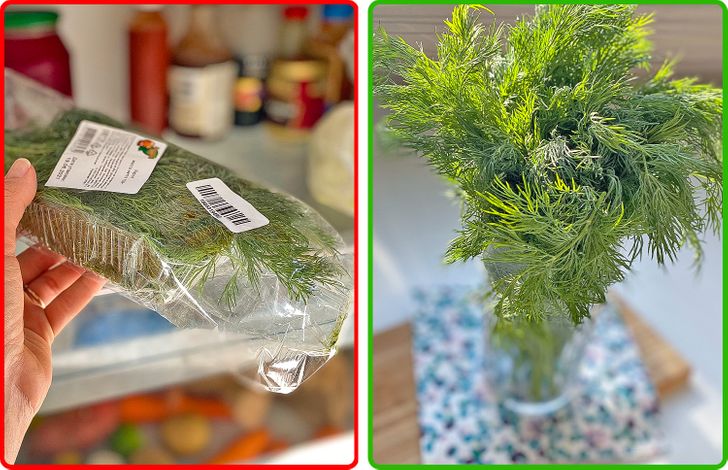
- Dill, parsley, cilantro, and mint are better when they’re not put in the fridge. In cool and humid conditions, these greens wither quickly and may even start to rot.
- It’s better to put bunches of greenery in pots with cold water and watch the water level and its freshness, just like you would handle a bouquet of flowers.
- Greens like rosemary, thyme, and oregano are better wrapped in tissue and stored in the fridge.
Berries
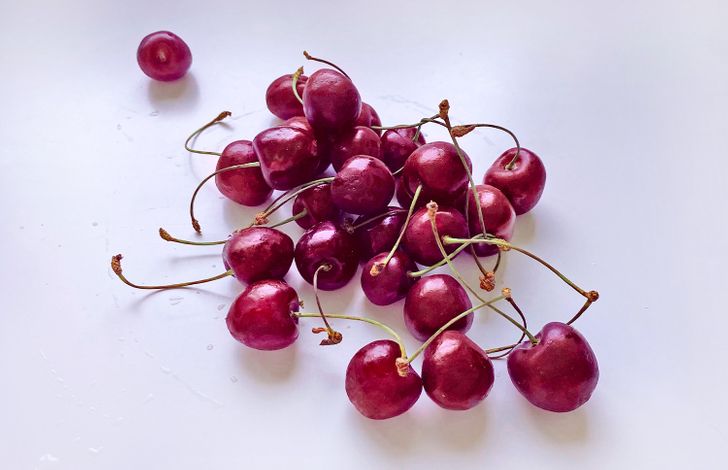
- Usually, berries can be kept in the fridge, but if you want to enjoy their taste fully, it’s better not to cool them down but to eat them on the same day or the day after you bought them.
- In order to preserve berries for as long as possible and prevent them from getting covered with mold, it’s better to wash them just before eating them.
Mango
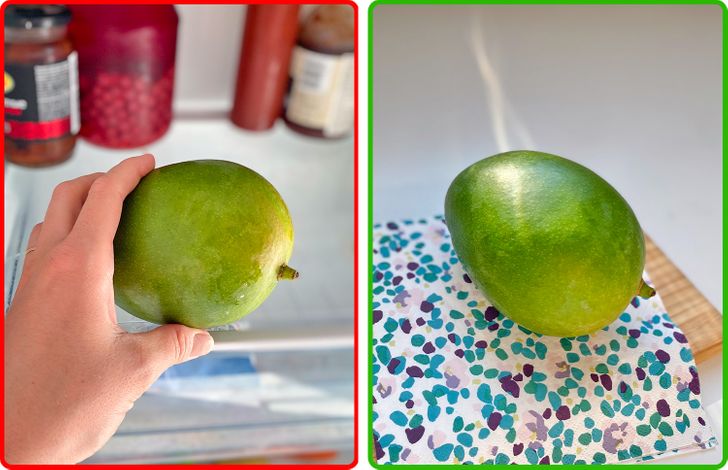
- Mango, kiwi, pineapple, and other exotic fruits don’t tolerate cold well.
- At room temperature, mangos and kiwis can ripen for several days, but be careful not let them get overripe.
- Ripened fruits should be consumed within 2 or 3 days. If you can’t do it in time, you can peel them, cut them into squares, and freeze them.
Apples and pears
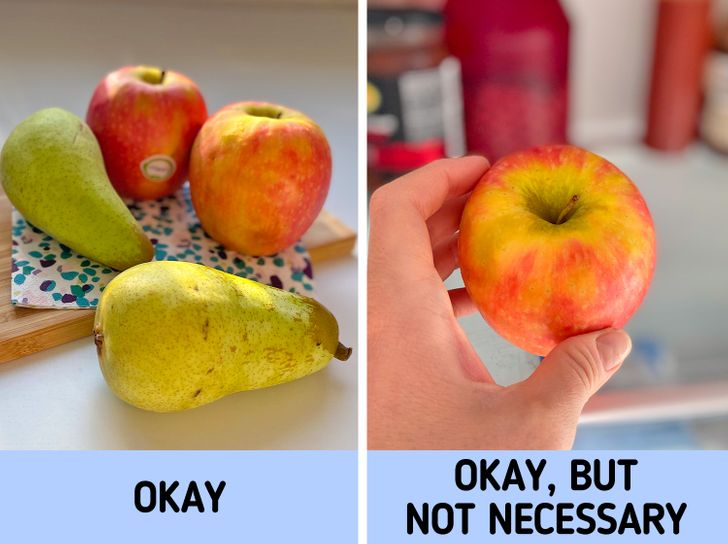
- It’s absolutely okay if you put apples and pears into the fridge, but it’s not necessary.
- If you store these fruits in cold temperatures, they won’t be as crisp.
Peaches
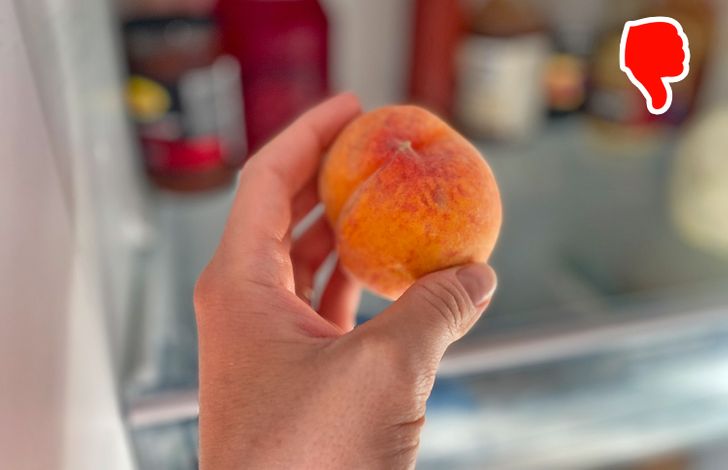
- It’s recommended to store greenish peaches outside the fridge — it will let them ripen completely.
- If you’re in a hurry and want the peaches to ripen faster, put them in a paper bag along with the banana.
- Don’t wash these fruits in advance. Wash them only before eating them.
Citrus
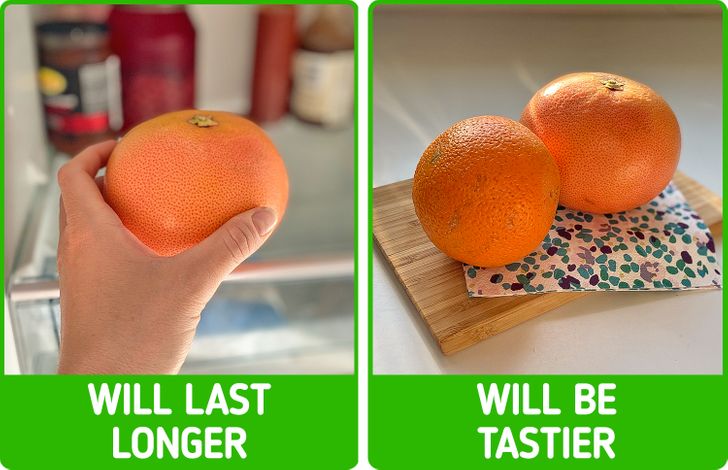
- Oranges, tangerines, lemons, limes, grapefruit, and other citrus fruits are better at room temperature.
- Make sure they don’t get moldy because one fruit can infect others.
- Citrus fruits can be stored in the fridge about one week longer than outside it.
Avocado
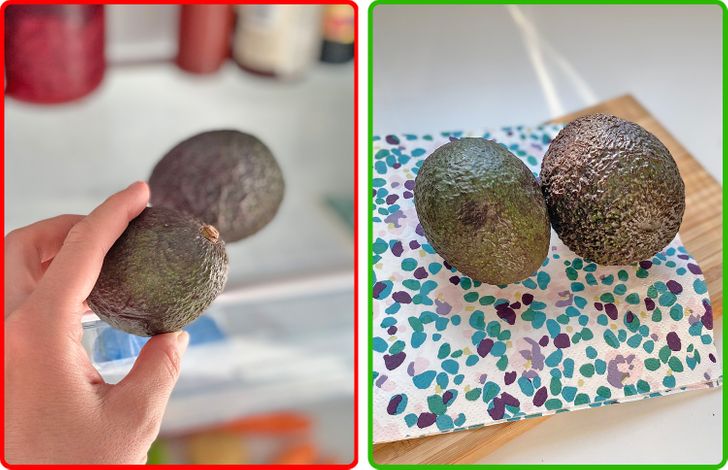
- It’s better not to store avocados in the refrigerator because they become less tasty from the cold.
- Make sure avocadoes don’t overripe. It’s better to eat them right after they get ripe enough.
Onions and potatoes
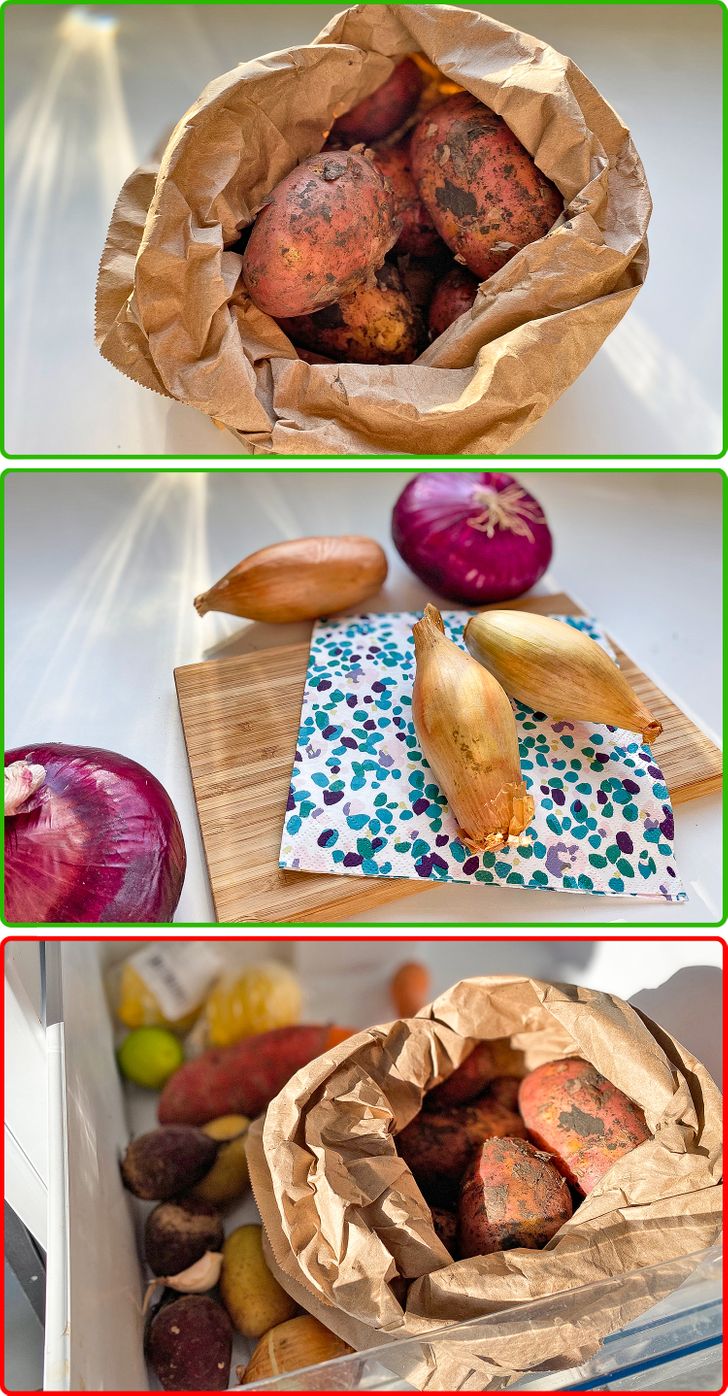
- It’s recommended to store potatoes and sweet potatoes in a cool, dark place. But it’s too cold in the fridge for potatoes, as the low temperature of the fridge is harmful to the potato starch. Therefore, this vegetable loses its useful qualities.
- Garlic goes bad in the fridge due to the increased humidity.
- Non-peeled onions are better to be stored out of the fridge because they contain starch that can make the vegetable get damp and go bad due to strong cooling.
Tomatoes
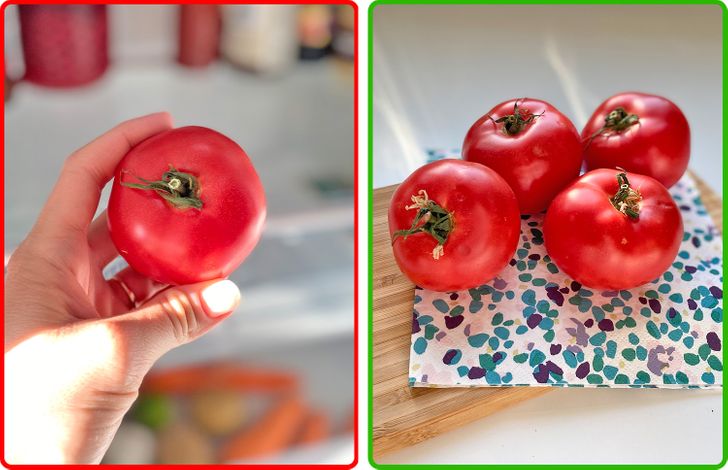
- Tomatoes shouldn’t be stored in the fridge.
- It makes them lose their texture, and they become soft and tasteless.
- Tomatoes store well for several days at room temperature.
Pickles
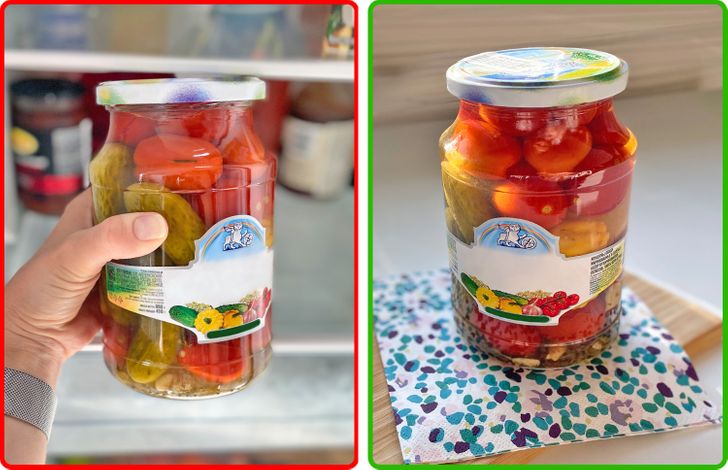
- Like salty condiments, pickles store well outside the fridge.
- Perhaps that’s thanks to the marinade that contains a natural preservative, salt.
Butter: whether to store it in the fridge or not
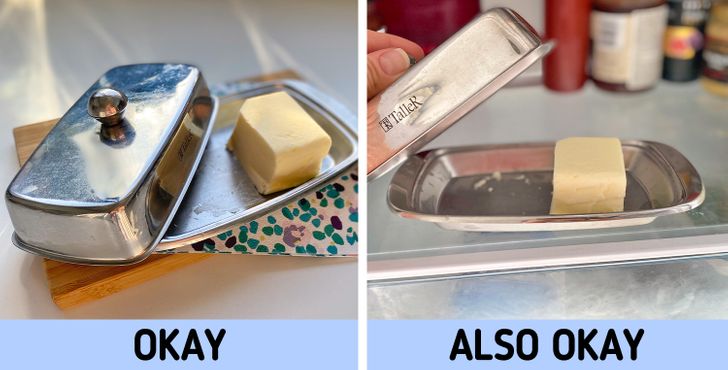
- It’s customary to store butter in the refrigerator, but, in fact, this particular dairy product won’t go bad if left at room temperature.
- Due to its high fat (a high-quality product has more than 80%) and fairly low water content, butter is preserved much better than milk, cream, and fermented milk products, such as yogurt, buttermilk, and so on.
- If you plan to store butter for a long time, you’d better put it into the fridge. But if you like soft butter at room temperature, then it can be kept out of the fridge for 1-2 days in a butter pot or under the cling film.
- If you store butter for a longer period at room temperature, it can become rancid and its taste and smell will change. In this case, it should be discarded.
- Salty butter can be stored out of the fridge for even longer than the regular kind thanks to the salt that slows down the reproduction of bacteria.
Chocolate

- Chocolate shouldn’t be stored in the fridge because it gets a white coating due to cold temperatures and loses its taste.
- Cocoa oil absorbs other smells, which can make the chocolate stored in the fridge start to smell bad.
Soda drinks
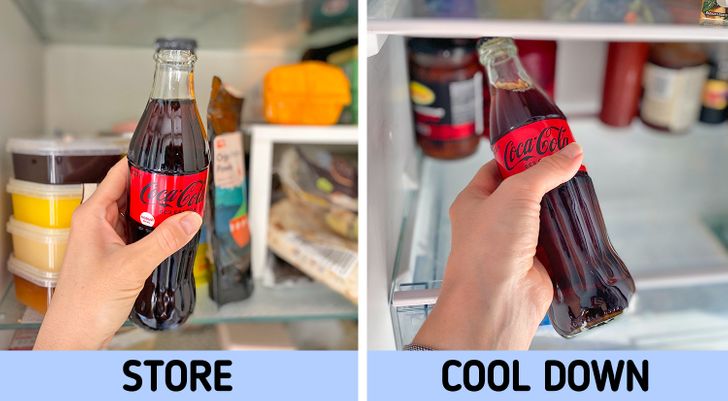
- Any soft drink can be kept out of the fridge.
- If you like to drink cool drinks, simply cool down the bottle before drinking it.
- Thanks to a large amount of sugar, soft drinks can be stored in the kitchen cabinet for their entire shelf life.
Bread
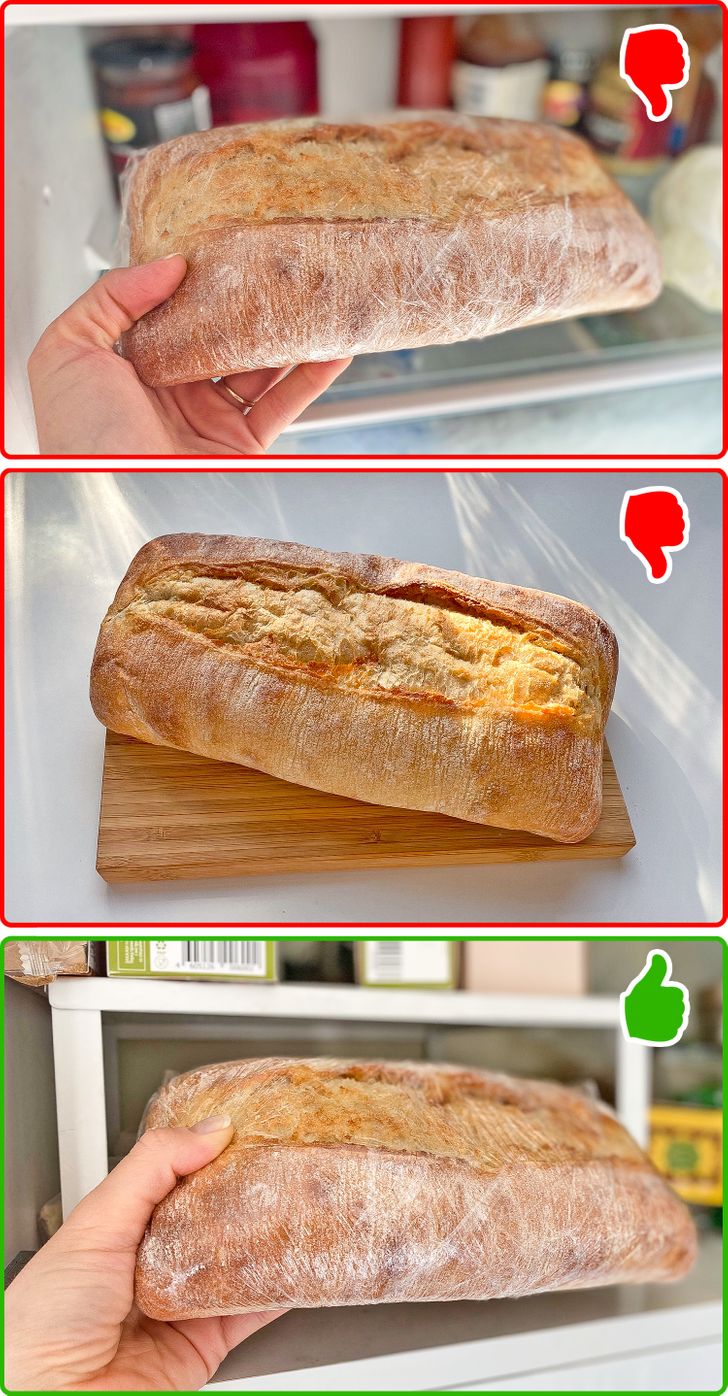
- It’s not recommended to store bread in the fridge.
- Many people keep bread in the fridge so that it doesn’t get stale.
- However, in fact, it loses moisture in the cold even faster.
- If you wrap the bread in a food film, it will grow stale much slower, even in the fridge.
- The best place to store bread is in a kitchen cabinet or breadbasket. But even in these places, the bread will keep its freshness for longer if it’s packed in a plastic bag that contains several holes to let the air in.
Honey
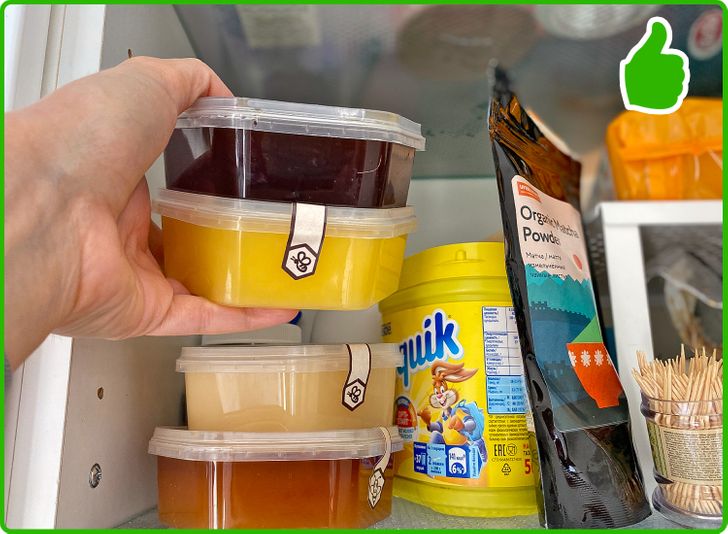
- If stored in the fridge, honey gets sugar-coated quickly.
- Honey should be stored at room temperature, far from direct sunlight.
Nut butter
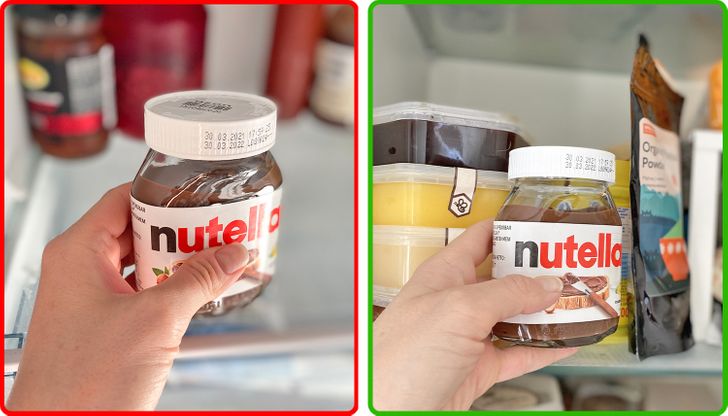
- Nut butter should be soft and easy to spread over toast.
- If you put it in the fridge, it will become solid.
- Moreover, the chocolate taste of the paste won’t be that saturated if you keep it in the cold.
Maple syrup

- It’s not recommended to place syrups in the fridge because the sugar in them starts to crystalize faster at low temperatures.
Bottled sauces
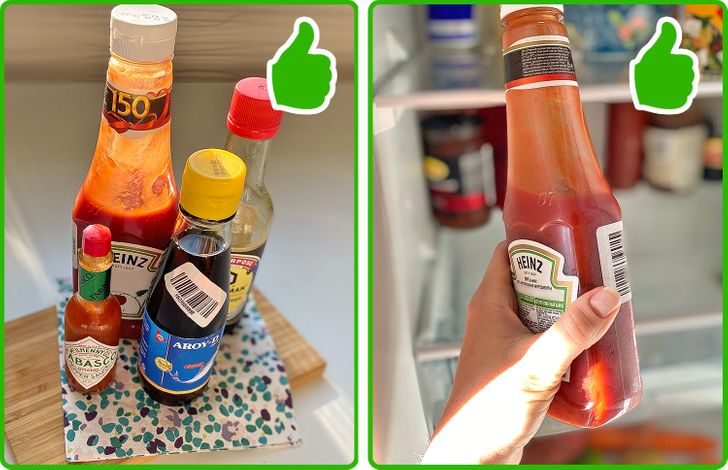
- Bottled ketchup was being sold long before refrigerators became widespread.
- It contains vinegar, sugar, and salt, so it can be stored at room temperature and not go bad.
- Many other bottled sauces, including soy sauce, also contain these ingredients, which is why they keep their freshness at room temperature.
- It’s recommended to place ketchup in the fridge only if you use it for a month or longer.
- Hot sauces can be stored outside the fridge for up to 3 years.
Salami
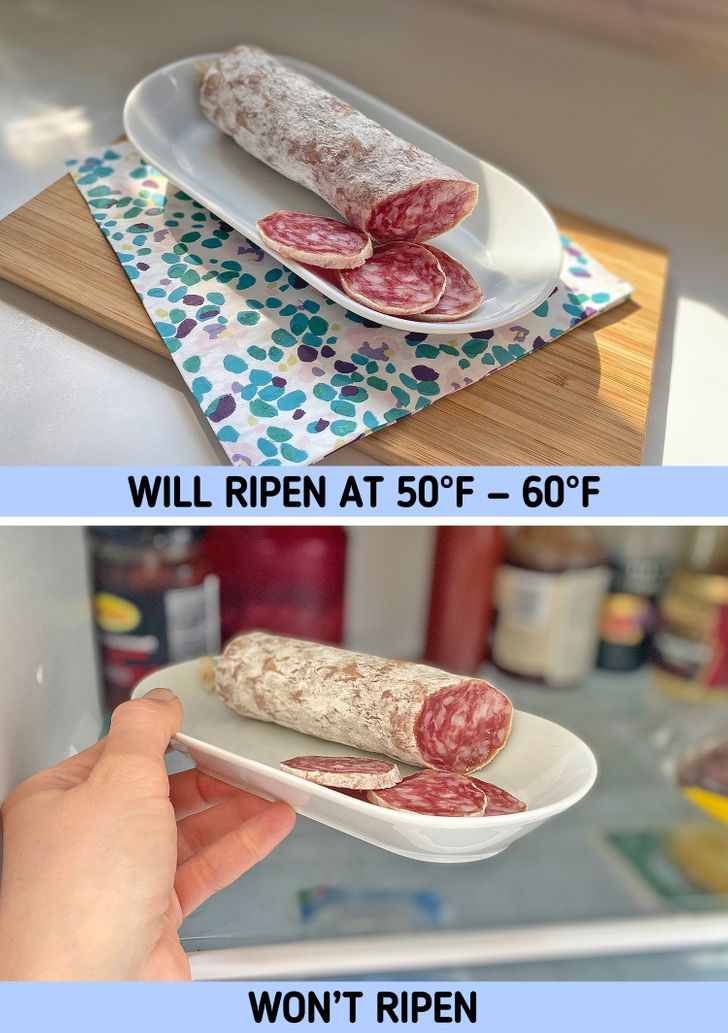
- Salami is a dry-cured sausage. And no matter how surprising it sounds, it will be better if you don’t store it in the fridge.
- The package of genuine salami indicates a storage temperature of 32°F to 60°F. But if stored at 50°F to 60°F, the salami will ripen.
Bonus: products that can be stored outside of the fridge
- Bananas
- Basil
- Dill
- Parsley
- Cilantro
- Berries
- Mangos
- Apples
- Pears
- Peaches
- Citrus fruits
- Avocados
- Onions
- Garlic
- Potatoes
- Sweet potatoes
- Tomatoes
- Pickles
- Butter
- Chocolate
- Soft drinks
- Bread
- Honey
- Nut butter
- Maple syrup
- Bottled sauces
- Salami
- Nuts
- Pumpkin
- Оlive oil
- Coffee
- Watermelon
- Eggplant
- Cupcakes
- Dried fruit
- Dry spices
- Jams
- Soy sauce
- Peppers
Please note: This article was updated in November 2021 to correct source material and factual inaccuracies.
Share This Article